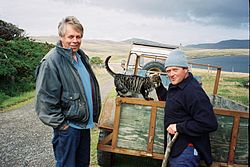- Falkland Islanders
-
Falkland Islanders 
Total population 3,105
(July 2007 estimate[1])Regions with significant populations  Falkland Islands
Falkland Islands United Kingdom
United Kingdom Australia
Australia New Zealand
New ZealandLanguages Religion Christianity
(Protestant (mainly Anglican and Presbyterian), Roman Catholic, Jehovah's Witnesses, Lutheran, Seventh-day Adventist)
Bahá'í minority[2]Related ethnic groups Falkland Islanders (also called Kelpers,[3] Falklanders; Spanish: Malvinenses, Malvineros/as) are the people of the British overseas territory of Falkland Islands.
Contents
Identity
The Islanders are British, albeit with a distinct identity of their own:
“ British cultural, economic, social, political and educational values create a unique British-like, Falkland Islands. Yet Islanders feel distinctly different from their fellow citizens who reside in the United Kingdom. This might have something to do with geographical isolation or with living on a smaller island – perhaps akin to those British people not feeling European. (Lewis Clifton, Speaker of the Falklands Legislative Council)[4] ” They also see themselves as no different from other immigrant nations including those of neighbouring South America:
“ We are as much a people as those in Argentina, Uruguay, Brazil and Chile and many other South American countries whose inhabitants are of principally European, Indigenous or African descent. (Councillor Mike Summers)[5] ” Demographic statistics
The following demographic statistics are from the CIA World Factbook, unless otherwise indicated.
Population
Population pyramid 2006 % Males Age Females % 0.85 85+ 0.91 0.61 80-84 1.02 1.22 75-79 1.08 1.93 70-74 1.39 2.94 65-69 2.06 3.82 60-64 2.74 4.16 55-59 3.11 4.33 50-54 4.09 5.28 45-49 3.55 5.58 40-44 4.26 4.43 35-39 4.57 4.26 30-34 3.59 3.01 25-29 3.99 3.05 20-24 2.20 2.40 15-19 2.81 2.54 10-14 2.91 2.67 5-9 2.61 n/d 0-4 n/d The 2006 census returns gave the population of the Falkland Islands, excluding military personnel and their families, but including staff working at the Mount Pleasant military base to be 2955. There were 1569 males and 1386 females giving a male to female ration of 1.13. This imbalance is most notable in the 40 - 60 age group.[6]
The population was estimated to be 3105 in July 2007[1] and the population growth rate was estimated to be 2.44%.[1]
Nationality
With retrospective effect from 1 January 1983, as provided in the British Nationality (Falkland Islands) Act 1983, the Falkland Islanders have been full British citizens. For the Argentine position on Falklanders’ citizenship, see Current claims.
Ethnic groups
About 70 per cent are of British descent, primarily as a result of Scottish and Welsh immigration to the islands.[7] The native-born inhabitants call themselves "Islanders"; the term "Kelpers", from the kelp which grows profusely around the islands, is no longer used in the Islands. People from the United Kingdom who have obtained Falkland Island status are known locally as 'belongers'.
A few Islanders are of French, Gibraltarian, Portuguese and Scandinavian descent. Some are the descendants of whalers who reached the Islands during the last two centuries. There is also a small minority of South American, mainly Chilean origin, and in more recent times many people from Saint Helena have also come to work and live in the Islands.[8]
Religions
The most predominant religion is Christianity, of which the primary denominations are Church of England, Roman Catholic, United Free Church, and Lutheran. Smaller numbers are Jehovah's Witnesses, Seventh-day Adventists and Greek Orthodox; with the latter being due to Greek fishermen passing through.[citation needed] There is also a Bahá'í congregation.[9] The islands are the home of the Apostolic Prefecture of the Falkland Islands.
Languages
- English
Sport
Main article: Sport in the Falkland IslandsThere are more than 30 different sports clubs on the Falklands, including badminton, clay-pigeon shooting, cricket, football, golf, hockey, netball, rugby union, sailing, swimming, table tennis and volleyball.[10] The Falklands compete in the Commonwealth Games and in the biennial Island Games.[11] Louis Baillon is the only Falkland Islander to have become an Olympic champion, as a member of the British field hockey team which won a gold medal in 1908.
References
- ^ a b c CIA World Factbook (2007)
- ^ [1] The Baha’i faith has a strong local following.
- ^ Chater, Tony. The Falklands. St. Albans: The Penna Press, 1996. p. 137. ISBN 0-9504113-1-0
- ^ Clifton, Lewis. The Falkland Islands: Self-government with an emerging national identity? News and Journal 2004, The 21st Century Trust. London, 1999. pp. 16-19.
- ^ Summers, Mike. Self-Determination In The Falkland Islands. In: L. Ivanov et al. The Future of the Falkland Islands and Its People. Sofia: Manfred Wörner Foundation, 2003. 96 pp. ISBN 954-91503-1-3
- ^ "Falkland Islands Census Statistics, 2006". Falkland Islands Government. http://www.falklands.gov.fk/documents/Census%20Report%202006.pdf. Retrieved 4 June 2010.
- ^ Vincent, Patrick (March 1983). The Geographical Journal, Vol. 149, No. 1, pp 16–17.
- ^ "UK | Falklands questions answered". BBC News. 4 June 2007. http://news.bbc.co.uk/2/hi/uk_news/6683677.stm. Retrieved 15 March 2010.
- ^ "Falkland Islands Bahá'í Community Newsletter". Horizon.co.fk. Archived from the original on October 10, 2007. http://web.archive.org/web/20071010072229/http%3A//www.horizon.co.fk/bahai_falklands/. Retrieved 15 March 2010.
- ^ Falklands Information website clubs page. Retrieved 9 July 2008.
- ^ Island Games website membership page. Retrieved 9 July 2008.
Links to related articles Anguillans · Ascension Islanders · Bermudians · British Virgin Islanders · Caymanians · Chagossians (Îlois) · Channel Islanders · Cornish · English · Falkland Islanders · Gibraltarians · Hongkongers (BN(O)s) · Manx · Montserratians · Northern Irish · Orcadians · Pitcairn Islanders · Saint Helenians · Scots · Shetlanders · Tristan Islanders · Turks and Caicos Islanders · Welsh
Demographics of South America Sovereign states Dependencies and
other territories- Aruba
- Bonaire
- Curaçao
- Falkland Islands
- French Guiana
- South Georgia and the South Sandwich Islands
Categories:- Falkland Islands society
- Demographics of South America
- Falkland Islands stubs
Wikimedia Foundation. 2010.
